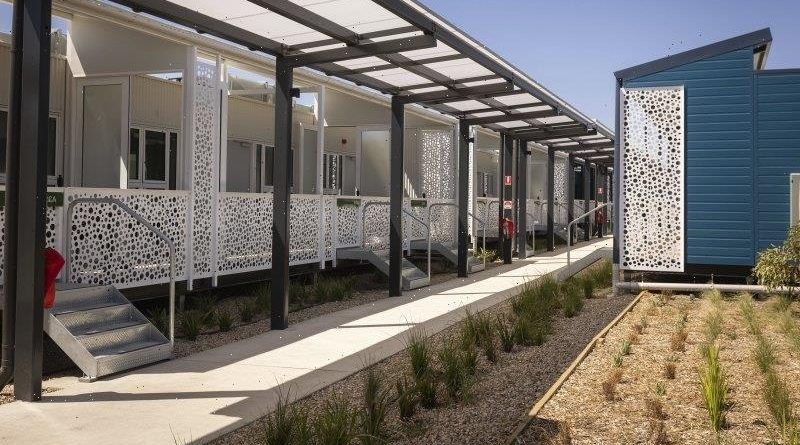Flood victims booted out of Mickleham centre ahead of its closure
Flood victims who have been staying at the Mickleham quarantine facility have been given a month’s notice about the centre’s shutdown, with some residents now being moved into hotels and caravan parks.
Residents found a letter under the doors of their rooms on Wednesday advising that they would need to leave the centre “as soon as possible”, with the majority to be moved to new accommodation over the next week so that staff could prepare for its closure on March 15.
Units at the Mickleham quarantine centre.Credit:Paul Jeffers
Residents and staff had been dealing with uncertainty for weeks as rumours swirled that closure of the government-run centre was imminent, but official confirmation was not offered until Wednesday – the same day The Age sent questions to Emergency Recovery Victoria.
Flood-affected Victorians needing accommodation had been offered a place at the 1000-bed centre, which opened in February 2022 after being purpose-built with $580 million in federal government funding as a COVID-19 quarantine hub.
The facility, which was costing the state government $1.5 million a week to run in mid-2022, closed in early October before reopening again on October 18 after floods smashed the state and left thousands of people homeless.
Residents say pressure had been mounting on them to move out since about January, with whispers about an end date in February.
About 300 Victorians have stayed at the facility since October. In mid-November, there were 192 residents. Forty-six remain.
Residents who cannot return home are going into social housing, a private rental or temporary accommodation such as hotels and caravan parks until a permanent home is found.
However, they are being thrown into a chronic housing shortage, with a 1 per cent vacancy rate for rental properties and record prices. The waiting list for social housing is also dire, with 55,000 households needing a home as of last June.
One man in his 50s, who asked not to be named, has been staying in Mickleham since his Maribyrnong rental home was flooded in October.
He said the centre had been helpful in getting him back on his feet but there had been a lot of confusion and “diluted information” in recent weeks.
“Yesterday was the first time I was told straight out ‘you have to be out’. That was a reality check,” he said.
He is being moved to a hotel in Melbourne’s inner west next week. He is employed but has been struggling to find a new rental home as he battles limited available properties and a 50 per cent jump in cost from what he had been paying before the flood.
“There are so few places and either they get snapped up really quick, they’re not liveable or they’re super expensive,” he said.
Joan Broughan, a housing worker for the aged based in the Goulburn Valley, said her clients staying in Mickleham started hearing in January that the facility could be closing and that they needed to have a housing plan, but they weren’t given anything in writing.
“They were really worried because they didn’t know what this meant for them and where they were going to be sent to,” she said.
“They were not really communicated with at all and as a housing worker, I was never communicated with. It’s a huge problem.
“They’re already traumatised by having their home destroyed. You’re catching them at their most vulnerable and they’re not able to articulate and advocate for themselves.”
Temporary accommodation at hotels and caravan parks is typically booked by Emergency Recovery Victoria in blocks of several days to two weeks. Broughan said that the stress of not knowing if they’d need to relocate could compound for people.
One woman in her 80s, who also asked not be named, said she was moved to a caravan park with a day’s notice late last week. She is now preparing to move to public housing.
She said she “could not fault” her experience at the Mickleham centre but she felt that the state government should have been upfront with residents about shutting the facility.
She said she kept asking staff in January about what was happening when she started to feel more pressed to move, but she couldn’t get any answers.
Emergency Services Minister Jaclyn Symes said residents were being supported into returning to their communities so they could reconnect with work, school and loved ones.
“It has been an incredibly challenging few months for those impacted by the floods – the centre has been a place for people from across Victoria to have a safe roof over their heads, food on the table and a community around them determined to help them recover,” Symes said.
“We will continue to stand with flood-impacted communities for as long as it takes to recover.”
From March 31, the centre will come under the management of the federal government, which will determine its next use.
The Andrews government and state authorities have come under fierce criticism over the Maribyrnong River flood after The Age revealed failures in the early warning system and planning decisions.
A statewide parliamentary flood inquiry propelled by the Coalition and the Greens is now expected to run parallel to Melbourne Water’s Maribyrnong River flood inquiry after its chair stood down to combat perceived conflicts of interest.
Staff from community health organisation cohealth have been supporting residents at Mickleham. A spokeswoman said many would be moving to temporary accommodation.
“Some of the clients we are supporting at Mickleham, and some we continue to support post their stay at the facility, have complex health and social support needs distinct from the impact of the floods, including history of homelessness, mental ill-health, disability and family violence,” she said.
“The trauma of the floods and the uncertainty about the future has understandably created anxiety for many residents.”
Western Homelessness Network coordinator Sarah Langmore said she felt for flood victims who were landing in an “utterly overloaded system”.
“I think the community would feel that if they end up in a housing crisis, they would be assisted, and there’s just no capacity,” she said. “Construction of affordable housing has to be a priority.”
The Morning Edition newsletter is our guide to the day’s most important and interesting stories, analysis and insights. Sign up here.
Most Viewed in National
From our partners
Source: Read Full Article




